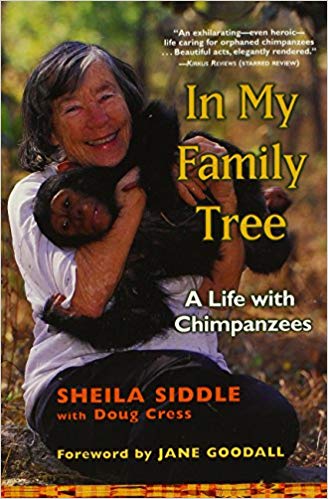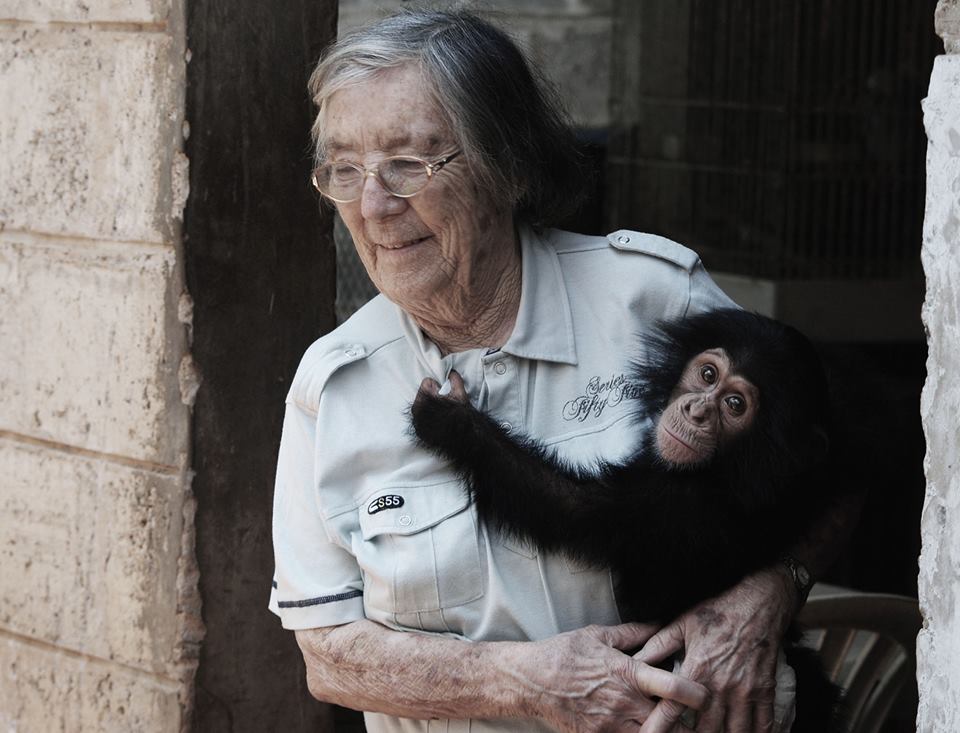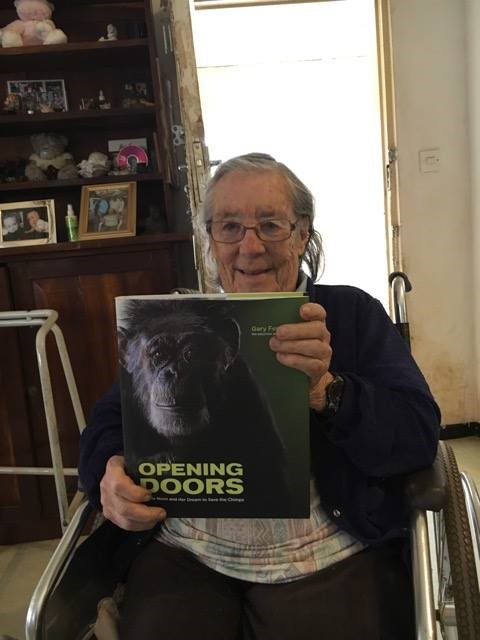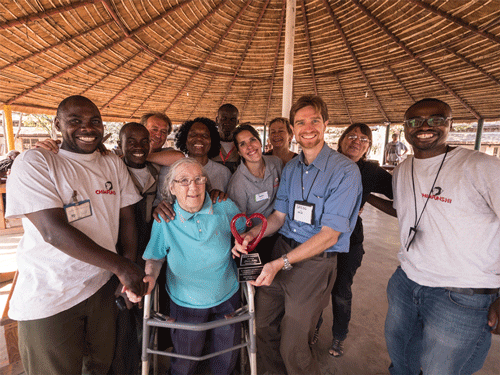Sheila Siddle
Founder of Chimfunshi Wildlife Orphanage, Zambia
Sheila Siddle
A remarkable woman who has done so much for Africa's chimpanzee refugees..(Dr Richard Leakey)
To acknowledge the significant sacrifice and dedication shown by the extraordinary leaders who have given their lives to protecting our planet’s wildlife. Sheila (Siddle) fits that description.
After raising five children and running a cattle farm for many years in Zambia, Sheila and her husband David Siddle were looking forward to life slowing down a bit on their property, Chimfunshi. Meaning “place of water” in the local Bemba language, Chimfunshi is situated near the Kafue River and was meant to be their home for a quiet retirement. However, on October 18, 1983, their game warden son-in-law showed up with a severely injured and traumatized infant chimpanzee named Pal. Despite raising cattle and keeping many pets, they had limited knowledge about wildlife rehabilitation and knew nothing about chimpanzees. Yet, they provided comfort, love and cared for Pal till his wounds healed. Pal would still suffer from severe nightmares and seizures, possibly due to the head trauma he had sustained before his rescue. Six months later, a second chimpanzee named Liza was rescued in a similar condition and was also nursed back to health by the Siddles.
While chimpanzees are no longer endemic to Zambia, at that period it was quite common for chimpanzees to be smuggled south from the Democratic Republic of Congo for the pet trade. When the Zambian government began enforcing laws against keeping wildlife as pets, Chimfunshi received many orphaned chimpanzees from government officials. While chimpanzees can be handled as infants, their behavior and strength make them unsafe to keep as adults. So, enclosures were built to safely house the chimpanzees. Today, the Chimfunshi Wildlife Orphanage spans over 10,000 acres and is home to 120 chimpanzees, including Pal, its first inmate. The conservation community took time to acknowledge the work done by Sheila due to teething troubles faced by the new chimpanzee sanctuary. When Dr. Jane Goodall saw their incredible achievements, she became an advisor and friend to the Siddles. In 1990, Jane even personally escorted an elderly chimpanzee named Milla to Chimfunshi after her owners at a bar in Arusha, Tanzania asked for help in finding Milla a good home.Courtesy: Pan African Sanctuary Alliance
AWARDS, HONORS
1995 - Jane Goodall Award
2000 - Special commendation, Nedbank Mail and Guardian Green Trust Award.
2000 - Global 500 Award, United Nations Environment Programme. 2001 - Audi Terra Nova Award nomination. 2001 - Order of the British Empire. 2014 - The Lord Houghton Award for outstanding service to animal welfare by ADI (Sheila Siddle, David Siddle and Sylvia Jones). 2017 - The Pan African Sanctuary Alliance (PASA) “Circle of Compassion” award.PUBLICATIONS
In My Family Tree: A Life with Chimpanzees, (with Doug Cress) - Grove Press (New York, NY), 2002 (memoir) ISBN: 1-919930-57-4.
In her 2002 memoir, In My Family Tree: A Life with Chimpanzees, British-born conservationist Sheila Siddle recounts her efforts to establish the Chimfunshi Wildlife Orphanage, an animal sanctuary located in Zambia, Africa. Siddle and her husband, David, owners of a 10,000-acre cattle ranch who had lived in Zambia since the 1950s, were widely known in the region for nursing sick animals back to health. On October 18, 1983, a game ranger brought a badly injured chimpanzee to the Siddles' home; with their help, the chimp, nicknamed "Pal," made a full recovery. "By electing to help a single chimpanzee," wrote Doug Cress on the Science in Africa Web site, "the Siddles' farm suddenly became the repository for dozens of injured and unwanted chimps from all over the world, forcing them to convert their cattle ranch into the Chimfunshi Wildlife Orphanage." The chimpanzees, which are often rescued from poachers and smugglers, share the sanctuary with a variety of other animals, including monkeys, parrots, tortoises, and a hippo. "They just keep coming and coming," David Siddle told Cress. "Our policy is to never turn away an animal in need, but it's staggering just how many chimps we get—and how many others we probably never hear about."
Along with providing urgent medical care to the chimpanzees, the Siddles also give the animals survival lessons. According to Donald G. McNeil, Jr., writing in the New York Times, "Jungle skills are something that Dave and Sheila Siddle teach their … chimps: how to poke tasty termites out of a log, which fruits are avocados and mangoes and which are poison—that sort of thing. They wish they could return their charges to the wild. But that will not be possible until Chimfunshi owns enough wilderness for chimps to teach chimps." To that end, the Siddles have greatly expanded the orphanage; as Cress noted, "by fencing large tracts of their property with 10-foot electrical wiring—and purchasing another 15,000 acres from a neighboring farm—the Siddles have made Chimfunshi the largest area ever set aside for captive primates."
The pair has received a number of honors for their work, including the United Nations Global 500 Award, yet they remain humble about their mission. "Maybe it's the similarities between chimpanzees and humans that are important—not the differences," Sheila Siddle told Cress. "We really aren't that far apart. All I know is that these chimps have given Dave and me far more than we can ever repay." Reviewing Siddle's account of the couple's experiences, In My Family Tree, Library Journal contributor Beth Crim wrote that the author "offers many warm and insightful stories of the chimps' intelligence, courage, and personality," while a critic in Kirkus Reviews stated: "If the orphanage has but a fraction the warmth and gentleness of Siddle's voice in this story, then the word sanctuary would fit well. Beautiful acts, elegantly rendered."Courtesy: Encyclopedia.com using the following sources: Kirkus Reviews, February 15, 2002, Beth Crim, review of In My Family Tree, p. 135, Library Journal, April 1, 2002, Beth Crim, review of In My Family Tree, p. 135, New York Times, February 4, 1998, Donald G. McNeil, Jr., "Humans Answer Call to Be Their Cousin's Keepers," p. A4.
The Chimfunshi Story by Doug Cress with Science in Africa magazine.
Opening Doors: Carole Noon and Her Dream to Save the Chimps (2014) ISBN-10: 0979668530 and ISBN-13: 978-0979668531
The inspiring true story of how one woman's vision and determination created the world's largest chimpanzee sanctuary.
When Carole Noon, a wildlife biology student, attended a lecture given by Jane Goodall, it was a life-changing moment for Carole herself, and, ultimately, for hundreds of rescued chimpanzees. She began working with Dr. Goodall on her ChimpanZoo program, which kindled the passion that would lead Dr. Noon in 1997 to establish the Save the Chimps sanctuary. Opening Doors: Carole Noon and her Dream to Save the Chimps tells the inspiring true story of how one woman's vision and dedication altered the lives of so many, and paved the way for a more humane world. Opening Doors chronicles Dr. Noon's personal journey from ardent animal lover to powerful advocate; from her field work at the Chimfunshi Wildlife Orphanage in Zambia to her initial bid to rescue 141 Air Force chimpanzees, who had been used in early space exploration and were subsequently deemed "surplus material." It also explores the ethical questions that drove her to create what is now the world's largest sanctuary for chimps rescued from biomedical research, entertainment, and the pet trade. Along the way we meet some of the chimpanzees who have found refuge at Save the Chimps and the devoted staff and volunteers who work to give the chimps a quality life. Poignant photographs throughout allow us to gaze into the eyes of the chimps with whom we share 97 percent of our DNA and to read the history written on their faces faces that are strikingly like our own.Go back to: Wildlife Guardians & Dedicated Conservationists
ABOUT CHIMFUNSHI
Chimfunshi Wildlife Orphanage is a sanctuary for chimpanzees, located in Zambia's Copperbelt Province. Chimfunshi started as a family-run wildlife orphanage, and today Chimfunshi is managed by a board of trustees to ensure the long-term sustainability of the sanctuary. Chimfunshi was founded in 1983 when a game ranger brought a badly wounded infant chimpanzee to the cattle ranch of David and Sheila Siddle. The Siddles nursed that chimp – named "Pal" – back to health, thereby establishing a tradition of care and respect that forms the legacy of the sanctuary. Once word of Pal’s recovery spread, the Siddles were inundated with orphaned chimpanzees. Although many of the chimpanzees were confiscated from poachers who attempted to smuggle the infants into Zambia for sale as pets, an equally large number were rescued from dilapidated zoos and circuses from all over Africa, Asia, Europe and South America. With 120 chimpanzees, Chimfunshi is now one of the largest chimpanzee sanctuaries in the world.
The orphanage is home to other rescued animals such as baboons, vervet monkeys, parrots, antelopes, owls, buzzards, sheep, and peacocks.
Chimfunshi is recognized as an “Important Bird Area” (IBA #22), an area recognized as being a globally important habitat for the conservation of bird populations. Chimfunshi is one of about 10,000 IBAs worldwide. Some of the species that can be found at Chimfunshi are: pale-billed hornbill, coppery tailed coucal, Miombo Scrub robin, red-capped Crombec, white-headed black chat, chestnut-backed Sparrow-Weaver, and broad-tailed Paradise-Whydah. Located 65 km west of Chingola on the banks of the Kafue River, the orphanage is a tourist attraction for those living in the Copperbelt towns and for international visitors to Zambia. Chimpanzees are not found in the wild in Zambia, the nearest populations are about 500 km north of Chimfunshi, but wildlife smuggling routes out of the Congo pass through Zambia. The sanctuary is a member of the Pan African Sanctuary Alliance.Chimfunshi has evolved into a major centre for education and research. The sanctuary offers the unique opportunity to observe the complex social behaviour of chimpanzees in their almost natural habitat and in large social groups. It also allows a number of social and educational projects in the field and a chance to get to know the people and culture of Zambia.
Animal welfare and research thus complement each other perfectly: primate researchers from around the world come to Chimfunshi to investigate the chimpanzees’ social behavior, communication and cognition. Scientists conduct observational studies while learning about the daily lives of people in an African country. In addition to observations of the chimpanzees that teach some students the methods of behavioural research, field trips are offered to investigate the unique flora and fauna of Zambia.The Education Center at Chimfunshi not only attracts international primate researchers but also students from America and Europe, as well as school classes and their teachers from Zambia. Chimfunshi works closely and regularly with scientists from the Max Planck Institutes for Evolutionary Anthropology (Leipzig, Germany), and for Psycholinguistics (Nijmegen, Netherlands), the Free University of Berlin, and Gonzaga University in the U.S.
Chimfunshi Wildlife Orphanage and their partner, African Impact, offer a volunteer program for supporters. Volunteers help care for chimpanzees through behavioural enrichment activities, infrastructure development and community farming initiatives.
Chimfunshi Wildlife Orphanage has opened a school on their grounds for local children, a health center for the local communities, and provides jobs and housing to local Zambians.
Courtesy: Wikipedia
ARTICLES OF INTEREST
The Story of Chimfunshi Chimpanzee Sanctuary By African Impact - 2016
The Story of Toto (and Chimfunshi) by Animal Defenders International - July 2012
Zambia: Hanging in the balance by Stephen Robinson, The Telegraph 2003
Chimfunshi ZAMBIA 2011 (YouTube video)
Jane Goodall & Sheila Siddle - appeal for helping chimpanzee Milla (YouTube video)



